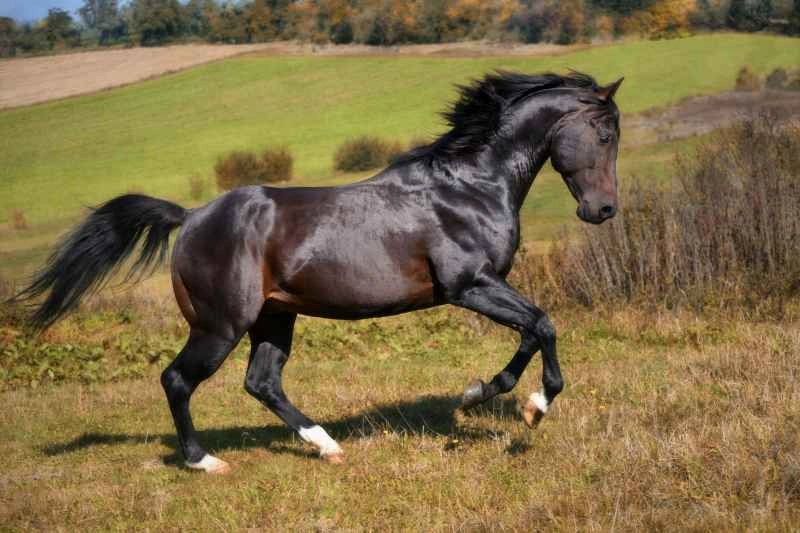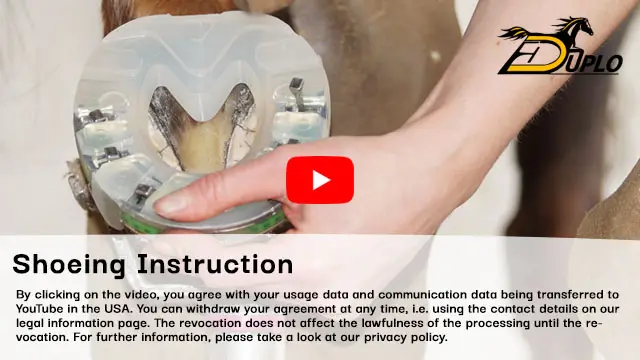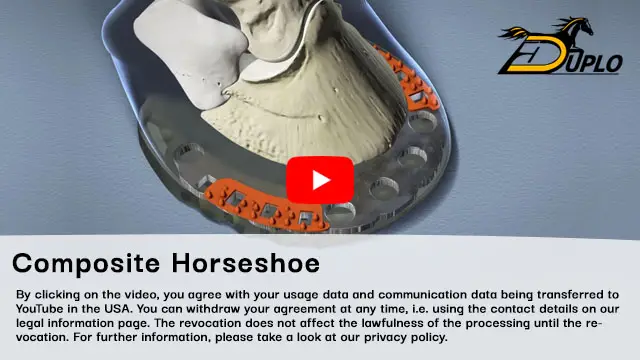Alternative Hoof Protection with Quarter Clips — our Best Seller
go to the online shopTrue to the Motto "No Hoof, No Horse", we Focus on a Healthy Horse Hoof
Nowadays, every horse owner knows the "conventional" steel shoe. Anything that is different is often classified as "alternative". We, however, see our product more as a modern high-tech shoe whose history began more than 20 years ago in the Bavarian Forest.
The Duplo composite horseshoe - the "original" made in Germany, a modern hoof protection that combines the advantages of two opposing materials on the horse's hoof.
Even if we are convinced of the positive influence on hoof growth and the natural hoof mechanism , we will never be categorical advocates of the "alternative" shoeing.
The world is neither black nor white and neither is it in the field of shoeing. Every product - whether it is a horseshoe, a steel shoe, a pure synthetic shoe or our composite shoe - has its function and its justification.
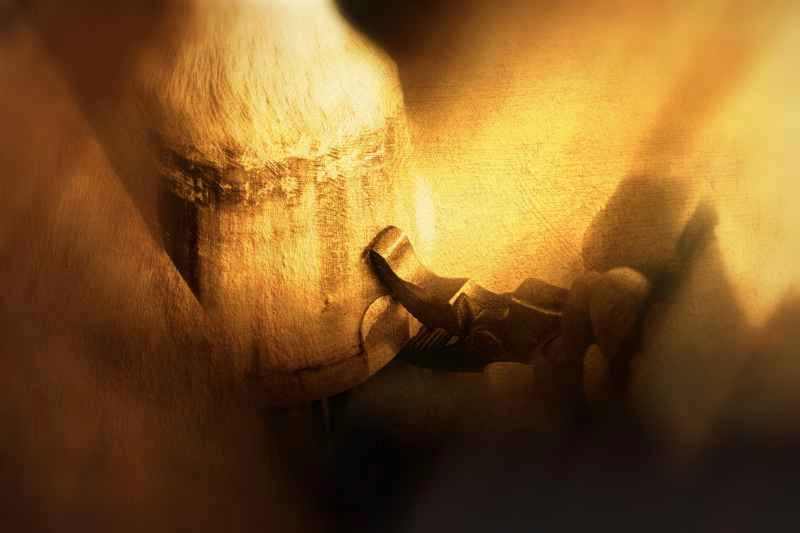
It is important that the farrier and horse owner work together to find the optimal hoof protection for the individual horse. For our customers, the most frequently chosen product in this case is our "best seller" with side caps.
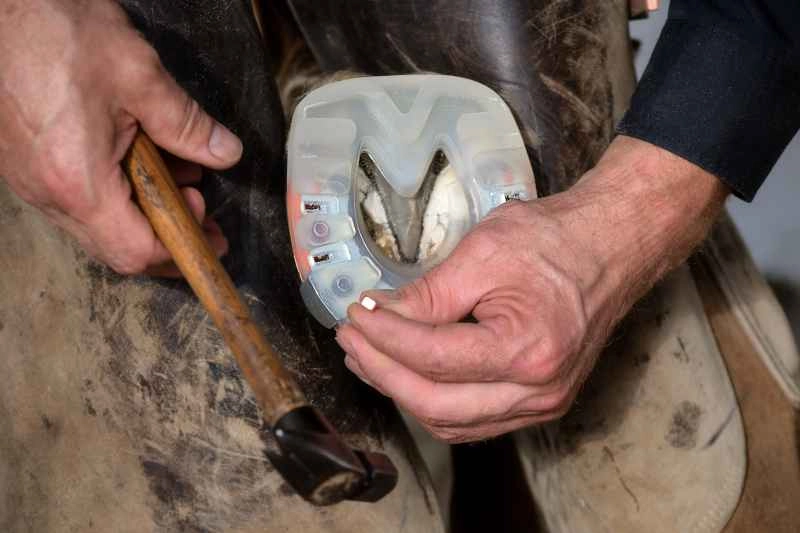
The Advantages of a Hoof Protection with Quarter Clips
- The clips facilitate the nailing process because the horseshoe is kept in position even before all nails are placed.
- During the regular shoeing cycle, they prevent the horseshoe from twisting or getting out of position.
- In many disciplines, the quarter clips are of immense importance - for example, in jumping, driving or even in Reining or Barrel Racing . I.e. usually whenever a horse has to make tight turns at high speed or in general when strong forces act on hoof and shoe.
What Makes Composite Horseshoes so Special
As the name suggests, this type of hoof protection is a combination - a composite - of the traditional steel shoe and the pure plastic shoe.
The plastic horseshoe has the advantage of being gentle on tendons and ligaments due to the shock-absorbing properties of the plastic material. For this reason, many people also like to use a hoof protection that is beneficial to the joints, e.g. for horses with arthrosis .
The steel shoe, on the other hand, gives the hoof stability; it does not bend as quickly as it can happen with a pure plastic shoe.
The ultimate goal behind the development of our composite shoe is the well-being of the horse. Our goal is to offer a functional hoof protection that impedes the natural hoof mechanism and hoof growth as little as possible and which gives the horse a protected but still close-to-barefoot walking feeling. We like to say that our shoes are a product "from farriers for farriers" because the professional experience as a farrier and the knowledge of horse anatomy formed the basis for the first ideas of Hubert Frank, the inventor and developer of our composite shoe.
The horse's hoof consists of hard (bony) and soft structures (frog , digital cushion , bulbs). This knowledge is the basis for the design of our composite horseshoe.
The solid steel core supports the hard structures of the hoof; the surrounding "plastic" shell protects the soft structures of the hoof without restricting their movements too much.
The bar made of plastic material promotes blood circulation in the frog without restricting him too much in his movement; both central aspects for a healthy frog.
Thanks to the flexible bar made of plastic, the frog is practically in contact with the ground when landing; it can therefore perform its function in the hoof mechanism, but at the same time it is protected from stony ground, for example.
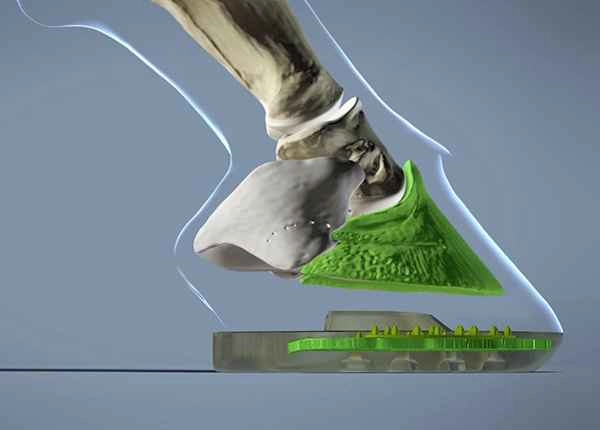
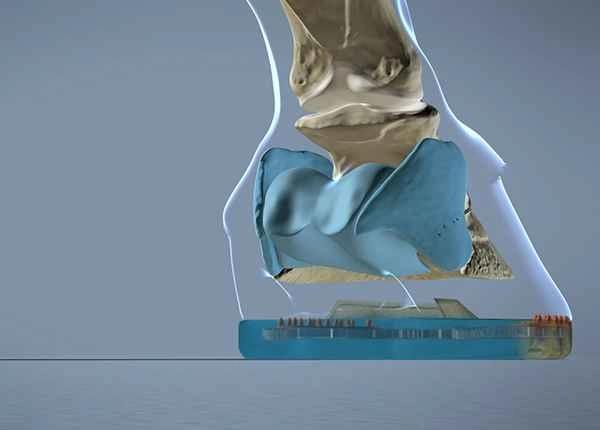
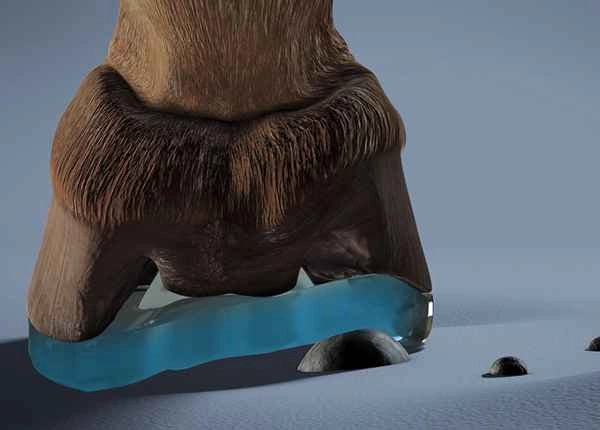
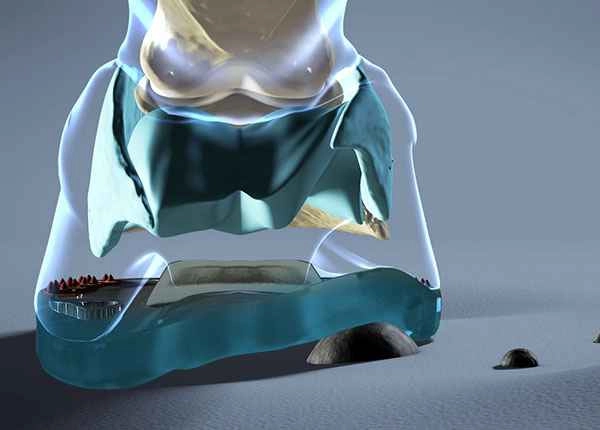
Alternative Hoof Protection for a Healthy Hoof - Photos
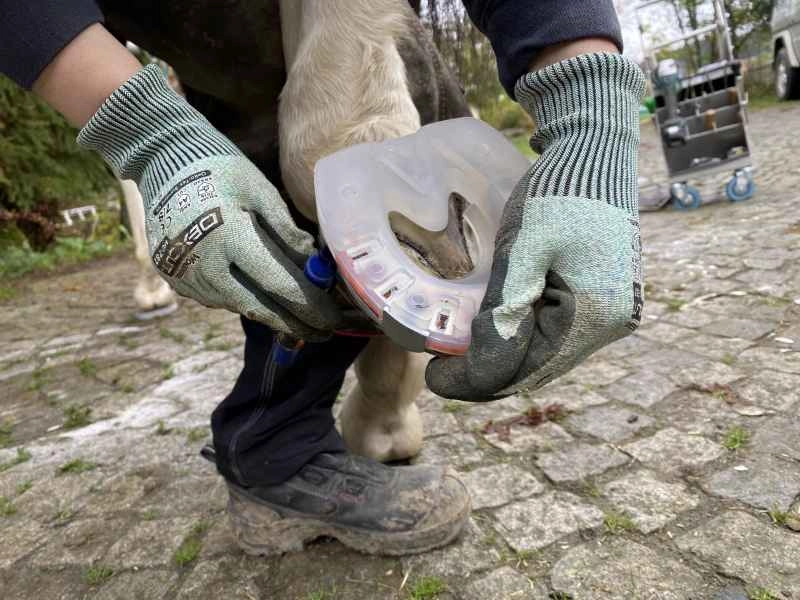
We draw the shape of the hoof on the shoe so that we can later adjust it to the hoof accordingly.
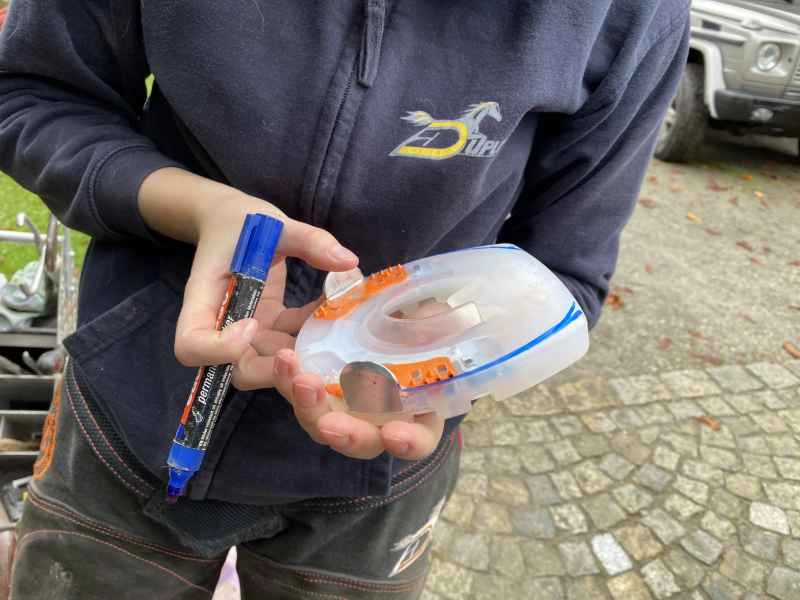
The shoe can be adjusted to the hoof with the help of a belt grinder, angle grinder or also with a toeing knife.
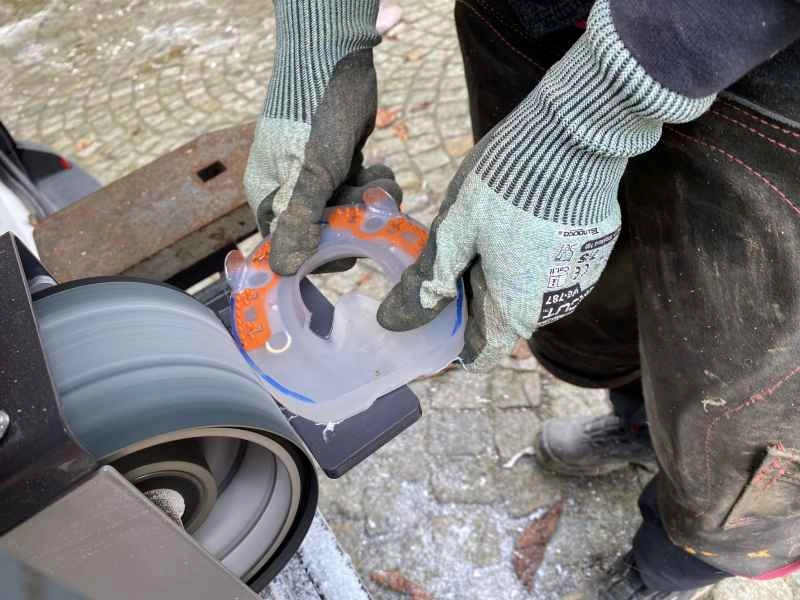
When grinding the shoe with a belt grinder or angle grinder, be careful not to inhale grinding dust.
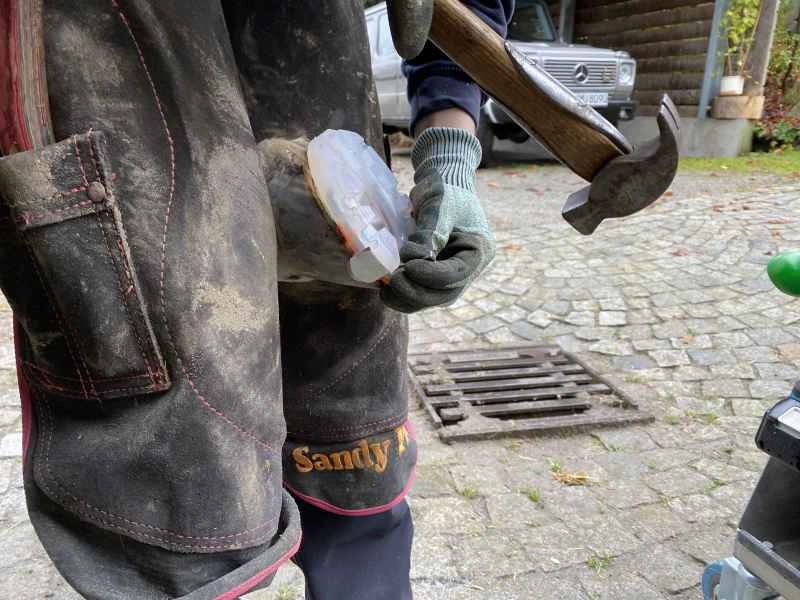
When nailing on our hrosehoes, please make absolutely sure that the nail head does not fit through the nail hole in the shoe.
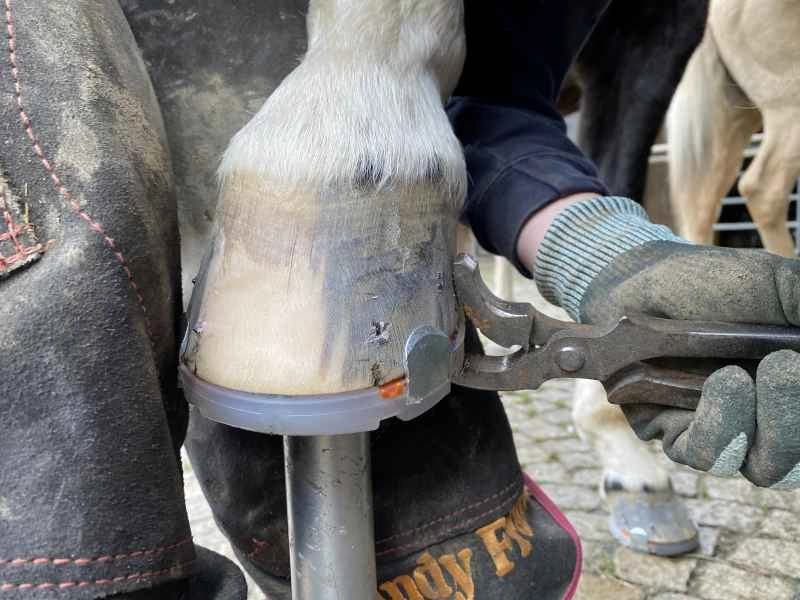
The correct riveting of the nails is extremely important in order to protect the horseshoe against displacements or torsions.
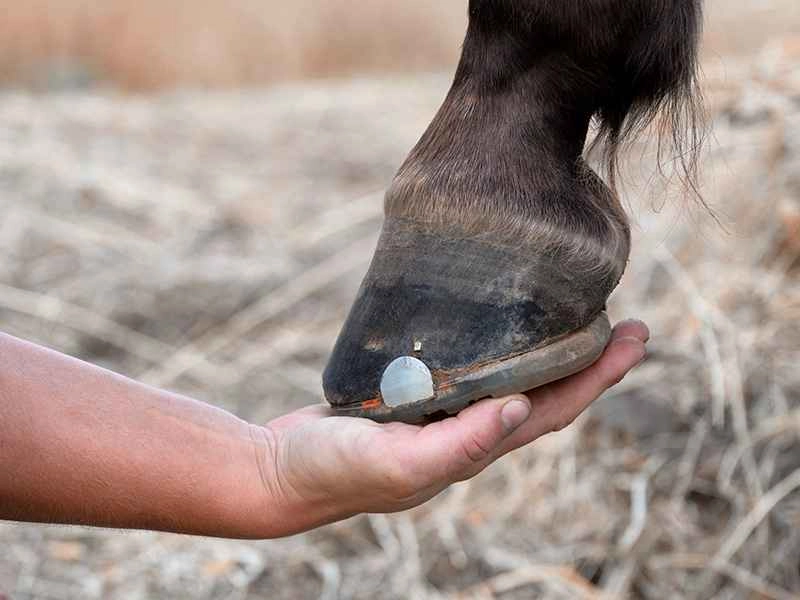
The target of our alternative hoof protection is to provide the horse with protection and functionality at the same time - for a healthy horse hoof.
Application and Safety Instructions for a Nailed Hoof Protection with Clips - VIDEO
We all sometimes dislike stepping into new territory. But even if the beginning is sometimes challenging, new paths often bring new opportunities. That's how Hubert Frank felt when he started his development work. The result of this new path is a functional hoof protection which you can apply well if you have the necessary knowledge around the hoof treatment and the professional nailing and riveting or gluing in case that you would like to use the Duplo as a glue-on shoe.
Whether you are a farrier or a horse owner: In order to avoid injuries to humans and horses, it is important that you read and follow our Safety Instructions when using our products.
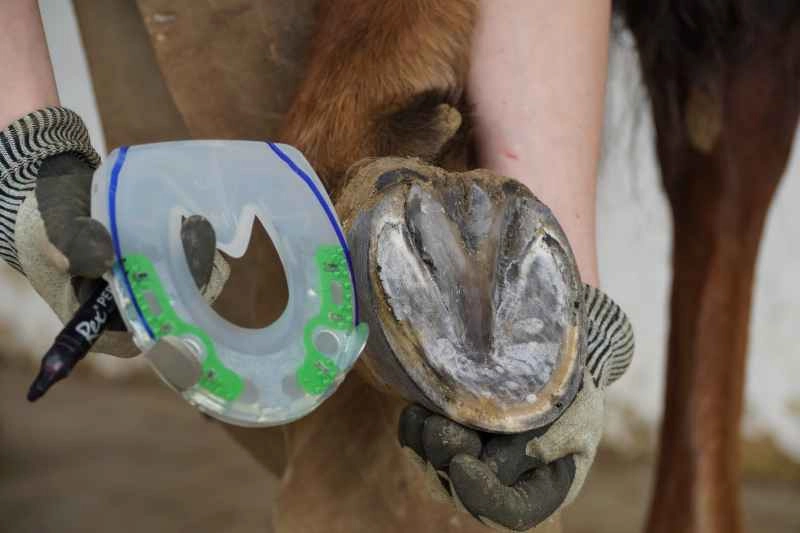
Why it is so Important to Choose the Right Shape and Size for a Good Hoof Protection...
The right shape and size and then, of course, the proper fit of the shoe to the hoof is the nuts and bolts. If the hoof protection - no matter if it concerns a steel shoe, a plastic shoe, horseshoe or composite shoe - does not fit properly, this can lead to the most diverse problems.
Imagine yourself constantly having to walk with shoes that are too big or too small... Tensions, misalignments, blisters on the feet or even the loss of the shoe when it does not really fit at all, are just some of the possible consequences. The same is possible in the field of in the area of hoof protection. The benefits can only act optimally on the hoof if the hoof protection is optimally adjusted to the individual hoof - and, in reverse, a mismatched shoe can actually cause problems.
Customization of Your Alternative Hoof Protection with Quarter Clips to the Horse's Hoof
The adjustment of the shoe to the horse's hoof is done quickly and, above all, easily on the farrier's joints, for example with the help of a belt grinder. Sometimes this can be a direct relief for the farrier's joints, which are under strain from forging. All information about the correct sizing as well as the customization of the shoe can be found in the section FAQ → Instructions.
If you want to use the shoe as an glue-on shoe, make sure that the shoe exceeds the hoof by approx. 1mm in the areas where you want to weld on the glue-on tabs later on. When using a shoe with quarter clips as a glue-on shoe, we recommend using the Wolf Busch® glue-on tabs.
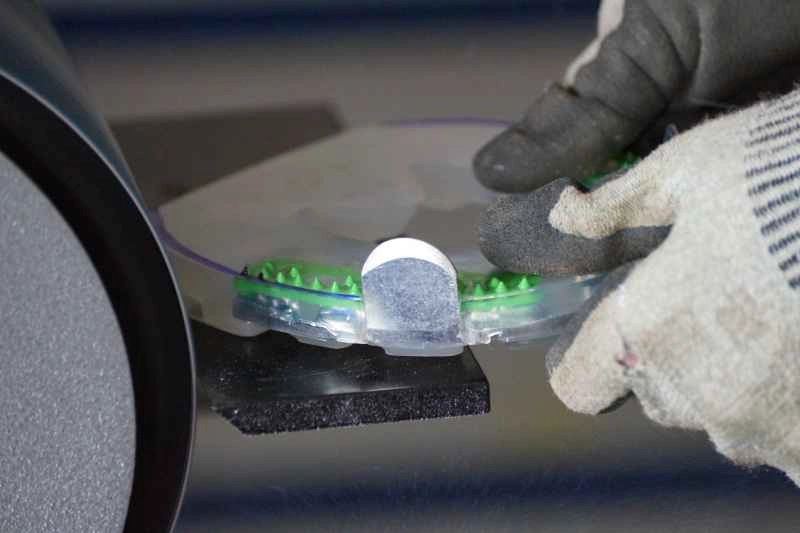
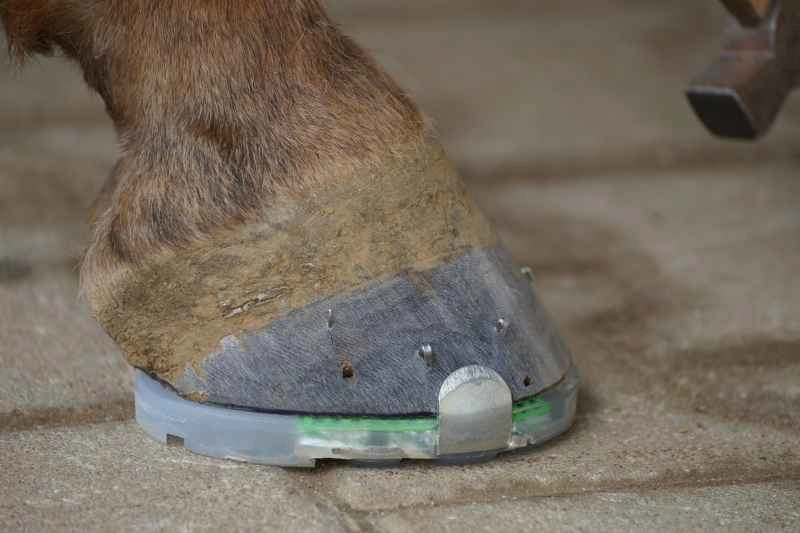
Special Safety Instructions for a Clipped Alternative Hoof Protection
As with a regular clipped steel shoe, the quarter clips - if not properly treated and "monitored" - can lead to injuries. Therefore, when shoeing, be sure to fit the side caps to the hoof, i.e. , match the angle of the clips to the angle of the hoof wall.
The correct and therefore secure fit of the clips, whether they are toe clips or quarter clips, should be checked once a day as well as before each use of the horse.
Shoeing Instructions - Nailed Hoof Protection with Quarter Clips
In our short video tutorial about the shoeing instruction, the state-certified farrier Stephan Becker shows the correct nailed application of our clipped composite horseshoe. The correct application of our shoes and its accessories is easy if you have the necessary knowledge of and competence in professionally nailing and riveting horseshoes and if you consider certain aspects while doing this. Decisive for a successful hoof protection is of course first of all the professional bare hoof treatment as well as the adjustment of the shoe to the hoof.
If you would like to use the shoe as a glue-on shoe, you can find the respective gluing instructions in the article description of our glue-on tabs.
Alternative Hoof Protection in the Form of Composite Shoeing - the Combination of Steel and Plastic Shoe on the Hoof
We have already written quite a bit about the advantages of both types of hoof protection. The stability of the steel shoe and the flexibility of the plastic shoe both have their advantages for the horse's hoof. The combination of both types in a composite shoe has so many advantages for the health of the horse's hoof. Take a moment and watch the whole thing "visually" in our video.
Product Specifications
| General Data and Delivery Information | |
|---|---|
| Model | Clipped Horseshoe - our Bestseller |
| Brand | Duplo |
| Manufactured in | Germany |
| Item Numbers | 130, 131, 420, 421, 330, 530 |
| Packaging Unit | sold individually |
| Shipment | within Canada — for worldwide shipments please contact the Duplo Team in Germany |
| Function and Application | |
|---|---|
| Function | (Alternative) hoof protection, shock absorption, stimulation of the hoof mechanism |
| Riding Styles and Disciplines | among others: leisure riding and orienteering, western riding, dressage , driving, gaited horses riding, baroque riding, ground work, cross-country riding, endurance riding , Eventing , Working Equitation |
| Horse Breeds | among others: Warmblood, Thoroughbred, Quarter Horse, Paint Horse, Haflinger, Icelandic Horse, Arabian, Friesian, Andalusian, Hanoverian |
| Season / Hardness Level | Available in both hardness levels and suitable for year-round use. During colder months, we recommend the slightly softer Standard horseshoes. In warmer temperatures, the slightly harder Extra version has proven to be more abrasion-resistant. |
| Measurements, Shapes, Sizes, and Weight | |
|---|---|
| Available Shapes | round and STS (usually fits front hooves) / oval (usually fits hind hooves) |
| Size Determination | Based on hoof shape and the widest part of the hoof (after proper trimming), or, if
necessary,
the size of the previous steel shoes. Feel free to use our free template. |
| Sizes (=Width) |
|
| Size Intervals | in 4mm steps |
| Length | varies by size – for details please visit FAQ → Sizes and Shapes |
| Thickness | 15mm |
| Weight | depending on the size from 200g up to 600g |
| Material and Construction – Special Features | |
|---|---|
| Plastic Coating | The soft plastic coating has a shock-absorbing effect. The bar made of plastic material can improve the blood circulation of the hoof. |
| Hoof Mechanism | The flexible synthetic material encourages the mobility of the elastic hoof structures. |
| Sole Area | The open sole design offers breathability to the hoof
sole
and the frog
. The molded synthetic lip, acts like a debris guard. It helps to reduce the amount of snow and debris balling up . |
| Grip | To improve the grip of the shoe you may add a deeper thread pattern and / or spikes. Always adjust riding speed according to the ground conditions, especially on slippery surfaces. |
| Knobs | The knobs are impressed into the weight-bearing surface of the hoof wall and help the
nail-on horseshoe keep its position on the hoof. When used as a cast or glue-on shoe, the knobs must be ground down before attaching the cast hooks / before plastic-welding the glue-on tabs to the shoe. |
| Metal Core | The metal core enhances durability and helps avoid unwanted pressure on the hoof. |
| Nailing Slots | The shoe features 6 to 8 nailing slots integrated into the metal core, depending on
size.
The optimal nail size varies by hoof condition and size. You’ll find general recommendations in our shop under hoof nails. |
| Quarter Clips | Quarter clips make nailing easier and help prevent the horseshoe from twisting or slipping
during the regular shoeing period. Be careful to adjust the quarter clips to the hoof angle when shoeing. |
| Shoeing and Customization | |
|---|---|
| Application | nail-on shoe, glue-on shoe or cast shoe |
| Shoeing Instruction | can be found unter FAQ → Instructions |
| Therapy Shoe / Rehab | The model is also suitable for supportive use in the orthopedic and therapeutic field. We expressly point out that our products do not diagnose or cure any diseases and advise for any use with a therapeutic or orthopedic background to work closely with the hoof specialist or veterinarian on site. |
| Customization | Always fit the horseshoe individually to the hoof shape – use an angle grinder, belt
grinder,
hoof nippers, or toeing knife. Advanced modifications (at your own discretion) are possible: narrow, widen, lengthen the shoe or close the sole area; you may also bend or grind a Toe Rocker . More info available under FAQ → Adjustment to the Hoof. |
| Accessories | among others Wolf Busch® glue-on tabs, Extensions , Hoof Sole Protector , wedge , colored stripes, cast hooks, Spikes |
| Safety Instructions | |
|---|---|
| Safety Information | can be found unter FAQ → Safety Information |
| Safety Instructions as PDF Download | PDF Download |
| Risk of Injuries in Herds | minimized risk of injuries in herd situations and in case of irregular movements in comparison to a steel shoe or the sharp-edged border of a bare hoof - please also read our safety information; the quarter clips must be monitored. |
Tipps and Tricks - the Clipped Shoe - the Right Choice for (Almost) Every Horse and Field of Application
This shoe with quarter clips is our best seller and therefore the right choice for most horses - nevertheless, depending on the riding technique and individual situation, other features may be important. For this reason, we offer a wide variety of models in our online store, so that there is a shoe for (almost) every horse and every hoof - whether it is a normal shoe with quarter clips and profile or thread inserts or also various special shoes such as our Jumper or the Arizona with a steel border around the toe area. If you are not sure which hoof protection is the right one for your horse, our Customer Service Team will be happy to assist you.
Modifications
If you just do not have the right model at hand, or in case that the size does not fit perfectly, you may modify our clipped horseshoes with a little bit of craftsmanship (at your own discretion) in many different ways:
- Our shoes can be modified to be more or less wide like a conventional steel shoe. We recommend using a vice or (for smaller sizes) pliers for this purpose.
- In order to facilitate breakover, you may add a toe rocker.
- For horses that are always losing a shoe because they make large steps with their hind legs and are (despite all adjustments) prone to forging, you can add an additional protection against forging on the bottom side of the horseshoe.
- For horses with sensitive hoofes and on very stony ground, we recommend shoes with a closed sole area. To modify a shoe with an open sole into a closed one, we have two different types of plastic plates in our range. You can choose between a fully closed sole and a grid sole.
- If none of our sizes seems to fit and if you are unable to adjust the shoe to the hoof by widening or narrowing it you may use our Extensions (at your own discretion) in order to make the shoe longer or wider.
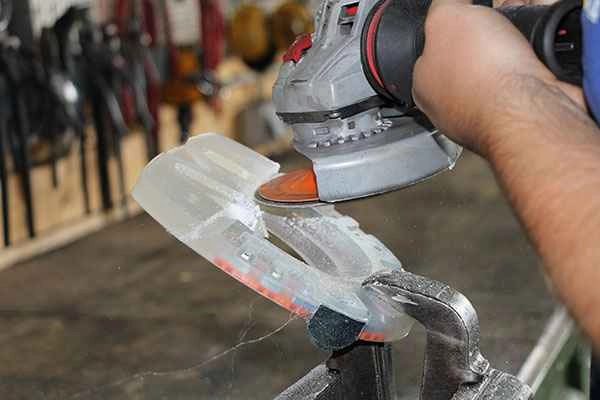
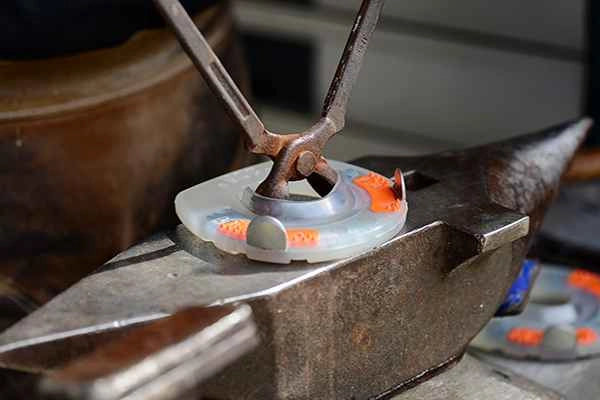
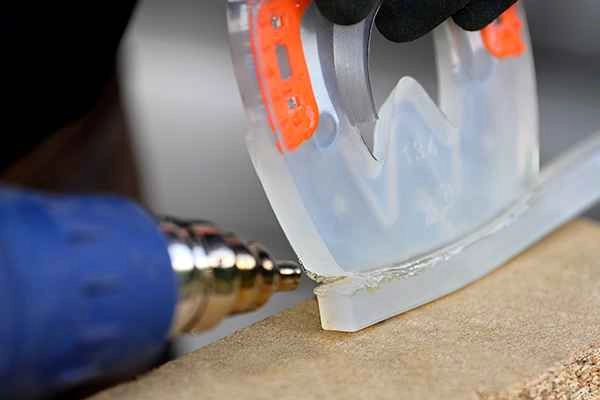
You can find more information about the possible modifications of our shoes under FAQ → Instructions.
Anti-Skid Protection
Every shoe from our company generally has a slightly profiled surface - sometimes, however, a little more slip protection is required. On slippery ground (e.g. freshly mown meadows, wet leaves) and in winter we recommend additional slip protection and reduced speed to prevent accidents.
Adding a Deeper Tread Pattern for Improved Grip
You may use your angle grinder with a coarse-grained grinding disk to make a profiled horseshoe from a regular model. Make sure the ground-off synthetic material doesn't clog the nail holes.
Of course, you can also buy a clipped and profiled shoe. The effect of the profile is roughly comparable to that of a more more strongly profiled hiking shoe compared to the normal sneaker.
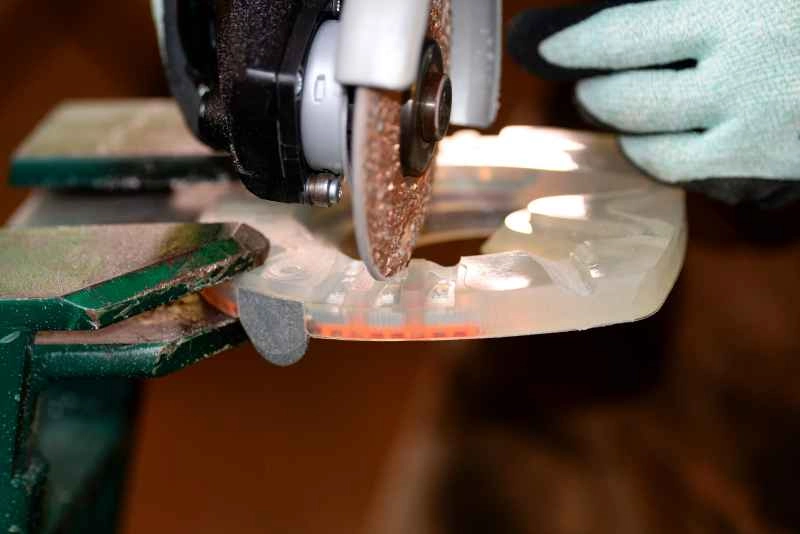
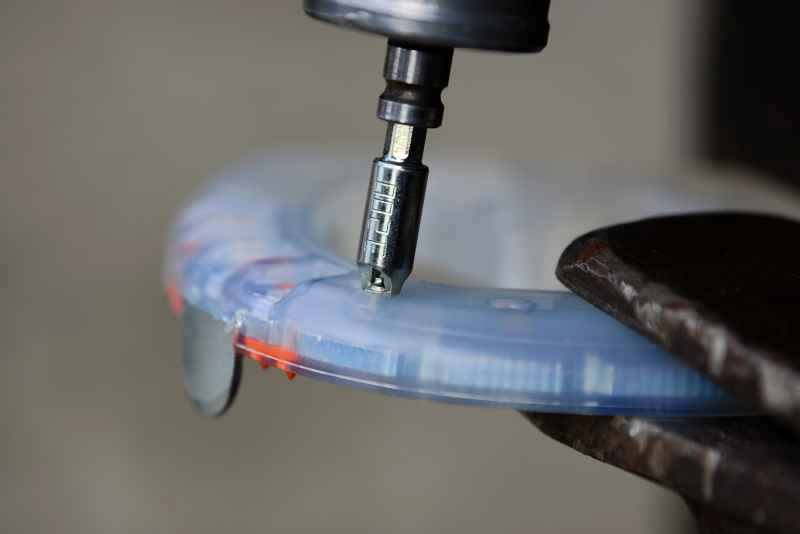
Spike Application for Improved Grip
For improved grip you mad add spikes to the shoe - similar to the widia pins in steel shoes. By the way, this still works for most horses even when the shoe is already on the hoof.
To install our spikes, you need the appropriate spike adapter. Please note that you can buy both spikes and spike adapters in two different sizes. The slightly larger L-spikes are not suitable for the toe area of the STS models.
If these anti-skid measures are still not enough we recommend our clipped and threaded horseshoes - the favorite model of many of our customers during the winter months.
Abrasion and Durability
In addition to the functionality of the hoof protection, durability is of course also an important aspect. How long a hoof protection lasts - whether a conventional steel shoe, composite horseshoe, hoof boot or a pure plastic shoe - depends not only on the product, but also on the horse and of course on external influences. First of all, of course, you can not make a general statement about the durability of any hoof protection - no matter what kind. A general guideline for a shoeing interval is 6 to 8 weeks, but even here there are there are differences from horse to horse. An endurance rider will have to re-shoe his horse sooner than a leisure rider. The horseshoes of a horse which is constantly pawing with its hooves or dragging its toes when riding will not last that long.
The same applies, of course, to the ground; the abrasion on asphalt is different to that on gravel paths or the riding arena. Here, of course, the temperature also comes as a contributing factor. We all know the phenomenon of hot ground from walking barefoot in the summer; different soils heat up differently. Especially with a plastic hoof protection - no matter if it is a pure plastic shoe, a hoof boot or a composite shoe - the temperature has a big influence on the abrasion behavior.
Almost all of our horseshoes are available in two different degrees of hardness. The Extra shoe is made of slightly harder material than the Standard shoe. While the Standard shoes can be compared to an all-season tire, the Extra shoes are more comparable to summer tires. They remain more abrasion- resistant even in warmer temperatures, but are less appropriate in winter. If you want to learn more about abrasion and durability, take a look at our FAQ section. In the section Durability and Abrasion, we have summarized all information about the durability of our composite horseshoes for you.
